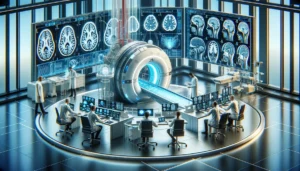Traumatic Brain Injury (TBI) presents a substantial challenge to healthcare systems worldwide, impacting millions of individuals annually. The complexity and variability of TBI symptoms necessitate personalized and adaptive approaches to rehabilitation and support. Artificial Intelligence (AI) transforms TBI care, offering innovative solutions that promise to improve the lives of those affected in 2024.
Personalized Rehabilitation Programs
AI algorithms can tailor rehabilitation programs to individual needs by analyzing vast patient data, including medical history, symptoms, and recovery progress. In 2024, AI-driven platforms utilize machine learning to adjust real-time therapy plans. Thus ensuring that each patient receives the most effective interventions based on their evolving condition. This approach optimizes recovery outcomes and reduces the time and resources spent on less effective treatments.
Speech and Communication Enhancement
AI-powered tools provide a lifeline for TBI patients struggling with speech and communication. Advanced speech recognition and natural language processing technologies enable these tools to interpret impaired speech patterns. Thus facilitating better communication with healthcare providers and loved ones. Moreover, AI-driven speech therapy applications offer interactive exercises that adapt to the user’s progress, making speech rehabilitation more accessible and engaging.
Cognitive Function Improvement
Cognitive impairments are common in TBI patients. AI-enhanced cognitive training applications offer a range of exercises designed to improve memory, attention, and problem-solving skills. These applications leverage adaptive learning algorithms to adjust the difficulty and type of tasks, ensuring that patients are consistently challenged and engaged in cognitive rehabilitation.
Emotional and Mental Health Support
AI technology benefits TBI recovery’s emotional and mental health aspects. Using sentiment analysis and mood-tracking algorithms, AI can help identify patterns in a patient’s emotional well-being. This insight allows healthcare providers to offer timely interventions and support, addressing issues like depression or anxiety, which are prevalent in TBI patients.
Advanced Monitoring and Predictive Analytics
Wearable technology integrated with AI algorithms continuously monitors TBI patients, providing valuable data on physical activities, sleep patterns, and other vital signs. This data is crucial for detecting potential complications and facilitating early interventions. Predictive analytics can forecast recovery trajectories, enabling healthcare teams to make informed care planning and resource allocation decisions.
Enhancing Caregiver Support
Caregivers of TBI patients often face significant challenges. AI-powered applications provide them with educational resources, symptom-tracking tools, and real-time support, easing the burden of care. Additionally, AI-powered virtual assistants can help manage medication schedules, appointments, and daily tasks, thereby reducing caregiver stress and improving the quality of care.
Conclusion
In 2024, AI’s role in improving the lives of people with TBI is not just a possibility but a reality. AI technologies are revolutionizing TBI care by offering personalized rehabilitation plans, enhancing communication, supporting cognitive and emotional health, and providing advanced monitoring and caregiver support. As AI continues to evolve, its potential to further transform the landscape of TBI treatment and rehabilitation is immense, offering hope and improved quality of life for millions affected by this challenging condition.






